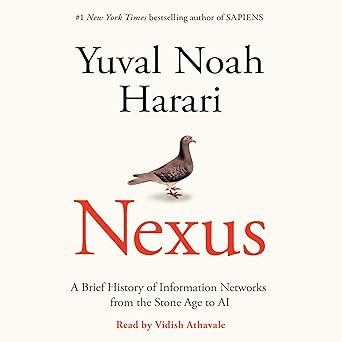
The power of information has been a double-edged sword throughout human history. For 100,000 years, our species has accumulated immense knowledge and technological advancements, which have enabled us to shape our world in ways that were previously unimaginable. However, despite all our accomplishments, we now find ourselves facing an existential crisis. The world is on the verge of ecological collapse, and the sheer amount of misinformation flooding our systems is making it increasingly difficult to discern truth from falsehood.
As we look through the lens of human history, it becomes clear that the flow of information has played a pivotal role in shaping our world. From the Stone Age to the present day, different societies and political systems have wielded information to achieve their goals, often with devastating consequences. The Bible, for example, played a significant role in canonizing certain ideas and attitudes, while the spread of false information during Stalinism and Nazism led to some of the darkest periods in human history. Today, the rise of social media and the internet has created a perfect storm of misinformation, which can be just as destructive as it is convivial. By examining the complex relationship between information and truth, bureaucracy and mythology, and wisdom and power, we can begin to understand the choices we face in the face of non-human intelligence threatening our existence.
What is striking about the current state of the world is that we seem to be ignoring the lessons of our past. We are repeating the same mistakes over and over again, often with alarming consequences. But perhaps we are also at a crossroads. By exploring the hopeful middle ground between the extremes of truth and manipulation, we can rediscover our shared humanity and begin to work towards a more sustainable and equitable world. This is a difficult and complex task, but one that is fundamentally worth undertaking if we are to avoid the existential crisis that threatens us all.
I recently finished reading a book that challenged my perspective on the power of information and its impact on our world. The author masterfully explores how humans have used information throughout history to shape their societies and achieve their goals. From the Stone Age to the present day, information has played a significant role in canonizing certain ideas and attitudes, often with devastating consequences. The book examines the relationship between information and truth, bureaucracy and mythology, and wisdom and power, shedding light on how these forces can intersect and influence one another.
For instance, the author draws parallels between the Bible and the spread of misinformation during Stalinism and Nazism. It's a sobering reminder of how information can be used to manipulate and control populations. The book also highlights the impact of social media and the internet on our current situation, where it's easier than ever to spread false information and create a culture of misinformation. What struck me most about this book was how it made me reflect on my own role in consuming and sharing information. Have I ever critically evaluated the sources I encounter online? Do I share information without verifying its accuracy?
As I delved deeper into the book, I began to see the world through a different lens. The author's analysis of the complex relationships between information, truth, and power revealed a profound truth: that we are at a crossroads. We can continue down the path of repeating past mistakes, or we can strive for a middle ground that balances wisdom and nuance. The author's vision for a more sustainable and equitable world is both inspiring and painful to acknowledge. The stakes are high, but the possibility of redemption is just as compelling. I left the book with a sense of hope and a renewed commitment to seeking out the truth, no matter how challenging it may be.
Rating: 4.2 / 5.0
The book poses a thought-provoking exploration of the double-edged nature of information. It examines how humanity has harnessed information to shape its world, often with devastating consequences. The author masterfully reveals the intricate relationships between information, truth, and power. Reading this book forced me to confront the ways I engage with information online and to reevaluate my own role in sharing and consuming knowledge. This book presents a compelling vision for a more sustainable future, one that balances wisdom and nuance. However, it also acknowledges the high stakes involved. Ultimately, the book's message is one of hope and responsibility, encouraging readers to critically evaluate the information they encounter and work towards a more equitable world.